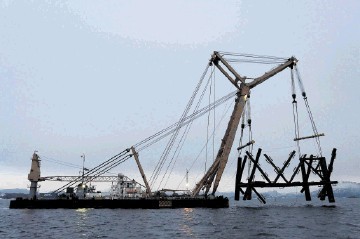
Industry body Oil and Gas UK (OGUK) said today that rules governing offshore decommissioning were “right, at this point in time”.
OGUK upstream policy director Mike Tholen said the organisation supported the UK regulator’s approach to Ospar regulations, despite “questions being raised” about their validity.
Ospar is a pan-European body which protects the marine environment of the north-east Atlantic and which takes its name from the Oslo and Paris Conventions.
Under Ospar rules, installations must be removed in their entirety once they reach the end of their production cycle.
But exceptions can be made if operators prove that removing platforms and subsea infrastructure would do more environmental harm and good.
A number of companies have asked for permission to leave infrastructure at sea in decommissioning plans submitted this year.
Tom Baxter, a senior lecturer in chemical engineering at Aberdeen University, has repeatedly called for the UK Government’s decommissioning regulator to challenge Ospar regulations in an effort to reduce decommissioning costs.
Mr Baxter has made the case for the money saved from leaving assets in place to be invested in renewable energy projects.
Speaking at the Offshore Decommissioning Conference at the Fairmont Hotel in St Andrews, OGUK’s Mr Tholen said: “We support the regulator’s approach to Ospar rules, which are in the right place at this point in time.
“Questions are being raised about Ospar, but I’m confident we’re heading in the right direction.
“We trust Ospar and want to work with it. There’s no simple answer at the back of the workbook. We’re not going to throw Ospar away, that’s not the way this industry works.”
Wendy Kennedy, chief executive of the Offshore Petroleum Regulator for Environment and Decommissioning (Opred), said “quite a large amount” of infrastructure was already being left in place and that the challenge was knowing where to “draw the line”.
Opred sits within the UK energy department and regulates the decommissioning of offshore oil and gas installations and pipelines.
Ms Kennedy said there would be a “lot of derogation cases” in future, but that in many cases it would be cheaper for the operator to just remove the infrastructure and get rid of the liability.
She said it may be possible to increase the number of steel jackets – the supporting structures of oil platforms – which could be considered for derogation by factoring in the weight of the piles which fix the jackets to the seabed.
Recommended for you

